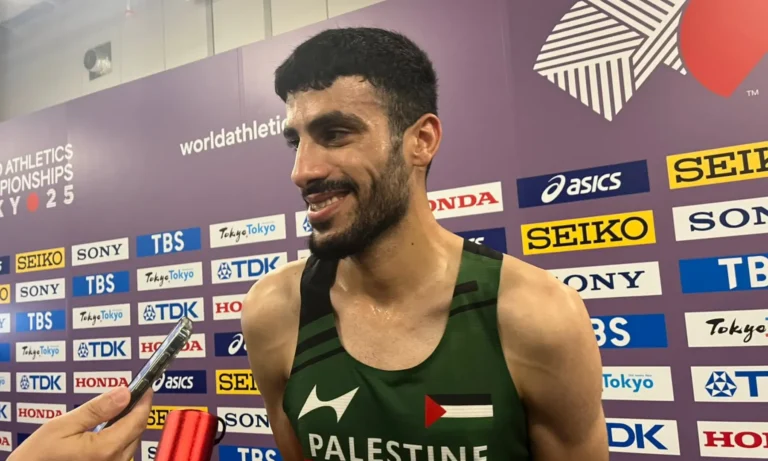Three months before the World Athletics Championships, Muhammad Dwedar’s training ground was not a professional track but the streets of Jericho in the West Bank. His mother feared for his safety, worried he could become another casualty of Israeli raids, but Dwedar had no sports facilities or advanced equipment. All he carried with him was a dream — to represent Palestine on the global stage and show the world his nation’s resilience.
Also Read: Suryakumar Yadav Dismisses Indo-Pak Contest as a Rivalry After India’s Asia Cup Win
That dream came true last week at the Japan National Stadium in Tokyo. Running in the men’s 800-metre race, the 24-year-old clocked 1:53.63, finishing last in his heat and second-last overall. Though it was faster than his time at the Paris Olympics, Dwedar was disappointed. His words spilled out in exhaustion after the race: “I am sorry to the people in Palestine, I know I can do better.”
His disappointment was not just about performance. It reflected a deeper struggle of representation and survival. Israel’s war on Gaza has killed more than 800 athletes, and for Dwedar, every lap is a message of defiance. Surrounded by reporters, he broke down as he spoke: “The children of Palestine, we have a lot of dreams; we have eyes, we have arms, we have muscles.” His voice quivered but his determination stood firm.
Dwedar believes he can run 1:46 — a time competitive at the international level. Training in Germany for two months before the championships gave him his first opportunity this season to use a synthetic track and spikes. Yet his mind was fixed on one thing: “I need to do better for Palestine. I need to improve so I can give Palestine a medal.”
His first chance to redeem himself will come at the Islamic Solidarity Games in November. After Tokyo, he plans to return to Jericho for a short visit with his family before resuming training in Germany. Despite opportunities abroad, his loyalty is unwavering: “I can leave Palestine for a few years to train, but in the end, I need to go back. This is my country, my city.”
Running has been part of Dwedar’s life since childhood, inspired by his older sister. He recently completed a degree in physical education from Al-Quds University, but the uncertainty of daily life under occupation makes long-term planning difficult. “The future? I don’t think in the future,” he said quietly. “I just think about life day by day. When I wake up, I just think about this day because I don’t know if the second day I’ll be alive or not.”
His words are a stark reminder of the fragility of life in Palestine. Yet, he continues to dream of breaking the national 800m record, running under 1:49, and competing at the elite level to win medals for his homeland. More importantly, he carries with him the dream of a free Palestine.
At the heart of his journey is the memory of his late father, who had always dreamed of seeing him become a champion. “Love you Dad, love you Mom,” he said into the cameras, a rare smile breaking across his face.
While his family and friends in Jericho watched him on television, the United Nations declared a genocide in Gaza. Asked about it, Dwedar’s voice trembled: “Stop genocide, really, just stop. I need to cry but I can’t. I can’t watch it anymore, just stop.”
His next race in November will not just be about seconds and medals. For Muhammad Dwedar, every step is for Palestine — a message of endurance, hope, and an unyielding will to keep running despite everything.


